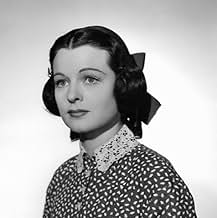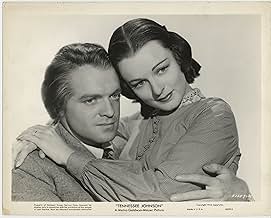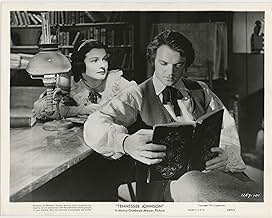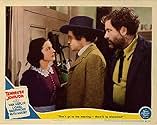Agrega una trama en tu idiomaBiography of Andrew Johnson, who followed Abraham Lincoln into office and became the first President of the United States ever to be impeached.Biography of Andrew Johnson, who followed Abraham Lincoln into office and became the first President of the United States ever to be impeached.Biography of Andrew Johnson, who followed Abraham Lincoln into office and became the first President of the United States ever to be impeached.
- Dirección
- Guionistas
- Elenco
- Sheriff Cass
- (as Noah Beery Sr.)
Opiniones destacadas
"Robert Maxwell" wrote> It's generally agreed that at the second inauguration, Andrew Johnson was skunk drunk when he took the oath and tried to make his speech. I just watched the movie, "Tennessee Johnson," and it appears that Johnson was ill during the inauguration and that Lincoln later sent him a letter saying something like, "If you took a drink more often, you would know better than to take brandy on an empty stomach because you are ill. I know you only were there because I asked you to be."
Does anyone know if this letter ever existed?
Reply. "Having worked for three years as an assistant editor with The Papers of Andrew Johnson and as a member of the Board of Directors of the Abraham Lincoln Association, which is engaged in supporting projects to edit the papers of the sixteenth president, I can safely say that no one I know has ever claimed such a letter to exist."
Anyone interested in the impeachment of Johnson might watch the first 20 minutes of Blight's lecture on the subject, on open courses from Yale. Don't be intimidated by "college" or "Yale". (I went there and it's not that demanding.) Blight gives an informative, objective, and lively presentation of the material -- interrupted briefly by somebody yelling "Let my people go," to which Blight replies, "You're free to leave...I hope that guy doesn't have a gun."
http://academic earth.org/lectures/black-reconstruction-economics-of-land-and-labor
Please eliminate the space between "academic" and "earth". It's only there because IMDb.com doesn't allow words that are too long, like floccinaucinihilipilification.
The liberties taken by the screenwriters to make Johnson into a shining patriotic hero were so egregious to some that a protest movement formed against this movie, leading to picket lines and angry print editorials. Strangely enough, the most vocal opponents to the movie were Vincent Price and Zero Mostel! The movie is mostly malarkey, but so were so many "history lessons" coming out of Hollywood, so this one doesn't offend me that much. The purpose was to inspire and celebrate rather than inform or educate. If only it succeeded more at the former the lack of the latter wouldn't be so noticeable. The movie is clunky in its pacing, and can't decide what it really wants to say about its protagonists. Heflin and Hussey do as good a job as they were able given the material, but many of the supporting cast are wasted in nothing roles. The production design is nice, with detailed settings and nice costume work. Running about 105 minutes long, the movie really needed another 30 or so to add more depth and nuance to the players.
There, we meet film subject Van Heflin (as Andrew "Andy" Johnson), in a leg iron. The future President is a runaway apprentice (between free-man and slave, but significantly closer to free). Bound to a tailor, Mr. Heflin has learned the profession and goes about mending figurative fences with local townsfolk. He learns to read and write from attractive Ruth Hussey (as Eliza McCardle), who becomes Heflin's first lady. Reading "The Bill of Rights" gets Heflin interested in expanding US Constitutional rights to include non-property owning "white trash" like himself...
Becoming successful in politics, Heflin's Johnson goes against the Southern grain by supporting some of Abraham Lincoln's platform; they both want to keep the Union whole. After the Civil War, President Lincoln selects Johnson as his Vice-President to help heal war wounds and assist in Reconstruction. Johnson has problems after succession to the top office. Yes, there are "dramatic liberties" (lies, even) taken, as the opening states. Heflin is fine, and makes Johnson a sympathetic character. Lionel Barrymore (as Thaddeus "Tadd" Stevens) and popular "silent" film star William Farnum (as Senator Huyler) have pivotal roles.
****** Tennessee Johnson (12/42) William Dieterle ~ Van Heflin, Lionel Barrymore, Ruth Hussey, William Farnum
I wonder what kind of career he would have had if he had lived longer.
Watch this movie with an open mind and really enjoy Heflin's acting.
As his adversary in the impeachment process, LIONEL BARRYMORE delivers another one of his more restrained performances without overdoing the ham. He and Heflin share some pretty dramatically effective moments, both of them in fine form. Heflin takes the character of Johnson from his humble beginnings as a tailor to his marriage to Hussey and his gradual emergence as a spokesmen for the people of Tennessee. For the sake of running time, it skips most of the years leading up to the Civil War and Lincoln's assassination, compressing all of those events and managing to keep the screenplay a tightly knit focus on the impeachment process itself. Only quibble is it fails to make clear the strongest point of the impeachment.
VAN HEFLIN plays most of his role in appropriate age make-up (as does Hussey) and they're both terrific. In lesser roles, MARJORIE MAIN, REGIS TOOMEY and CHARLES DINGLE provide colorful support.
Summing up: May not be a complete history lesson, but it will certainly cause viewers to probe more deeply into the detailed background of historical interest. And it does serve to remind us what a fine actor Van Heflin was in a demanding role.
¿Sabías que…?
- TriviaThere was a protest from some sectors that the film distorted the life of Thaddeus Stevens (who initiated the impeachment proceedings against President Andrew Johnson). Additional filming occurred in October 1942, but it is not known if it was because of these protests. One line in the script (Stevens referring to Lincoln as "the old ape") was eliminated. Still, the film treats Johnson much more favorably than it does Stevens.
- ErroresA key scene in the film depicts Johnson entering the Senate while it is debating his impeachment and removal from office, and making a major speech there in his defense. In reality, the actual President Johnson, despite his desire to confront his enemies in the Senate, never once entered or addressed that body during his impeachment trial.
- Citas
Jefferson Davis: I must pronounce our solemn farewell. Under these circumstances, of course, my functions - and those of my colleagues - terminate here. We but tread in the path of our fathers when we proclaim our independence - and take the hazard, putting our trust in God, and in our own firm hearts - and strong arms - we will vindicate the right as best we may.
[looking slowly around the room]
Jefferson Davis: I see now around me some with whom I have served long; there have been points of collision. For whatever offense I have given, I ask forgiveness. Of whatever of offense there has been to me, I leave here. I carry with me no hostile remembrance. I go hence unencumbered of the remembrance of injury received, and having discharged the duty of making the only reparation in my power for any injury offered.
[pausing]
Jefferson Davis: Mr. President; Senators - having made the announcement which the occasion seemed to me to require - it remains only for my colleagues and myself to bid you a final - adieu.
- Créditos curiososThe opening outline includes a disclaimer about historical facts being changed for entertainment purposes.
- ConexionesReferenced in Sheldon Hall on Omar Khayyam (2023)
- Bandas sonorasThe Battle Cry of Freedom
(1862)
Written by George Frederick Root
In the score during the foreword, reprised in the score for the last scene
Selecciones populares
Detalles
- Tiempo de ejecución
- 1h 43min(103 min)
- Color
- Relación de aspecto
- 1.37 : 1






































